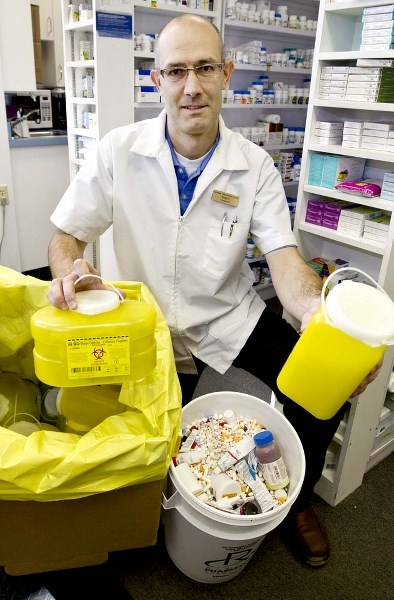For many, spring cleaning involves clearing out the winter clothes from the closet, sprucing up the yard or doing home repairs.
Tossing out expired and unused medications should also be part of your spring cleaning routine, says Ryan Diprose, pharmacist and co-owner of Grandin Prescription Centre.
He says a common issue that pharmacists see are people mixing up expired medications with new ones – whether mistakenly ingesting an expired pill, or accidently putting drugs together in the same bottle.
“As time goes on your health changes and the other medications you take change,” he explains. “What was safe to take five years ago – an anti-inflammatory, Tylenol, cold and sinus products – may not be the safest thing to use anymore.”
Expired medications are dangerous, but not for the reasons most people think, says Diprose.
“Some antibiotics will break down into something harmful, but that’s a rare situation. The majority of time you lose benefit, the potency of the product will deteriorate substantially, but it likely won’t cause any harm.”
He urges people to only keep the essential medications on hand in their medicine cabinets or kitchen drawers. Toss out the tablets, liquids, creams – even if they aren’t expired but you’re just not using them.
“To keep it simple, throw it all in a bag and bring it back to your pharmacy to dispose of it properly,” says Diprose.
The Alberta Pharmacy Association collects expired drugs through the ENVIRx Program. In 2011, the program collected more than 60 metric tonnes of unused and expired medications from community pharmacies.
“People think that because it is a tablet, capsule, or non prescription drug, that it is safe to dispose of in the garbage or recycling or down the drain,” says Diprose.
Anything that has medication in it can cause potential problems in the environment, he notes.
Traces of pharmaceuticals in the environment have been a growing concern over the last two decades, states Health Canada. Chemical components of drugs have been shown to contaminate water supplies, soil and affect aquatic species such as fish, mussels and algae.
Blood products such as syringes, EpiPens, lancets – anything used to pierce the skin – should be kept in a yellow biohazard container and disposed of at your neighbourhood dispensary. Pharmacies will no longer accept blood products being stored in vessels like margarine containers and bleach bottles, says Diprose.
It’s a good practice to remove (and shred) the labels from prescription bottles, Diprose says. Taking pills/tablets out of individual bottles and packages and combining them into one will also make for easier disposal.
He says doing an annual spring cleaning of your medicine cabinet is also a good time to make an appointment with your pharmacist.
“It’s an opportunity for the pharmacist to sit down with them and go through everything more thoroughly… to look at the whole picture, not just at the stuff they’re throwing out,” he says, adding that it does not have to qualify as a formal medication review or comprehensive annual care plan.
People can also help their elderly parents and neighbours clean their medicine cabinets and drawers, adds Diprose.



